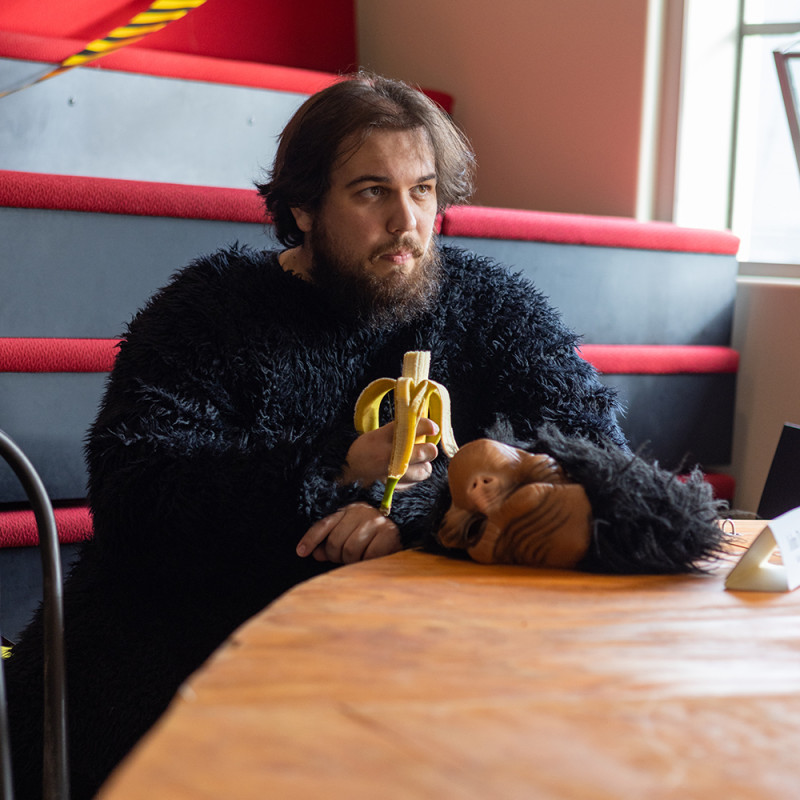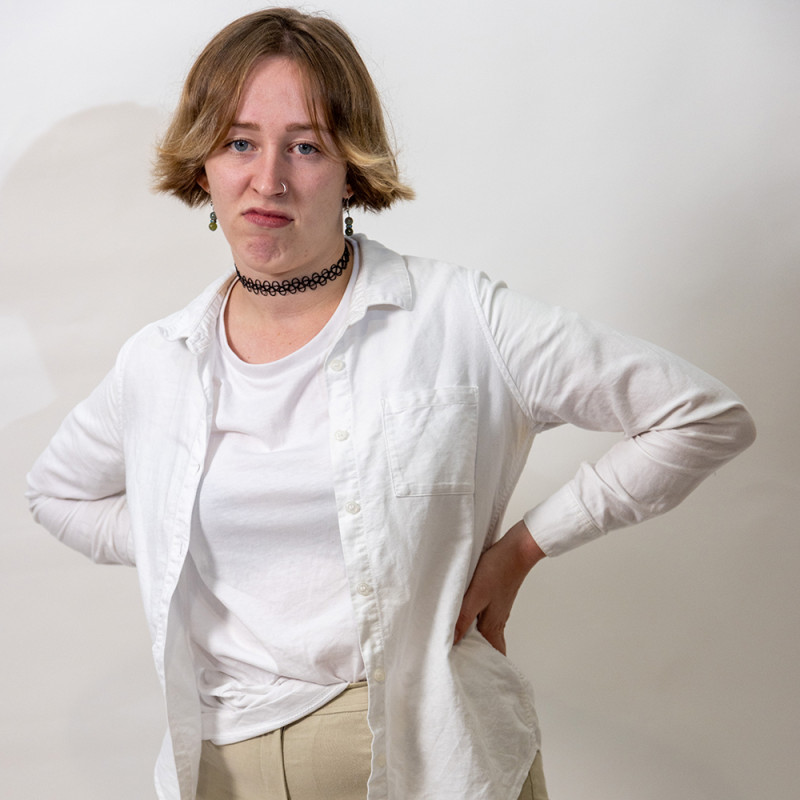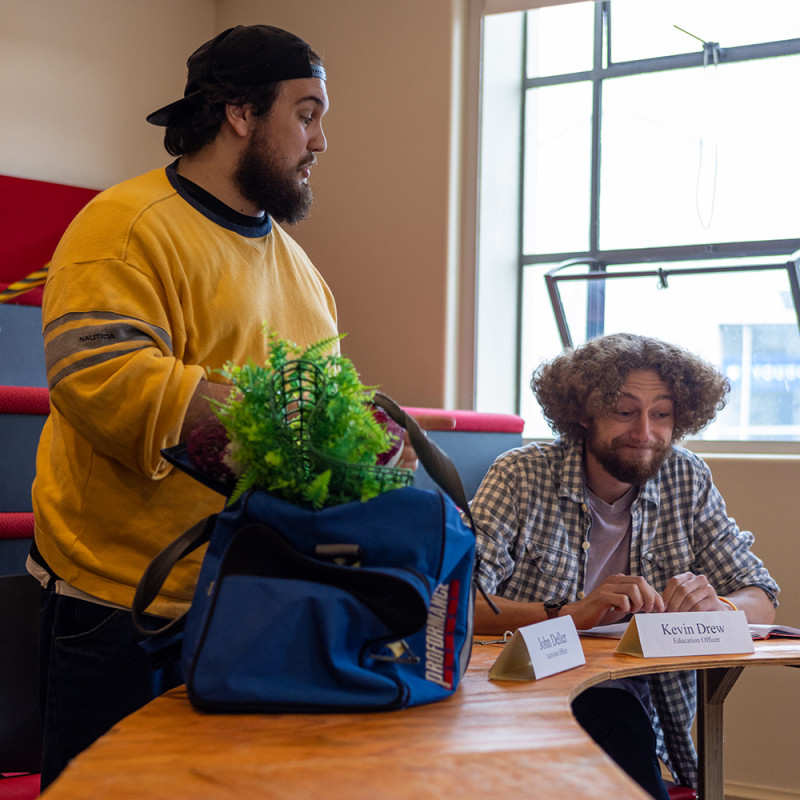


Emerging theatre companies of Wellington – Squash Co Arts Collective by Finlay Langelaan
Wellington is a melting pot of creatives. In our new emerging theatre companies of Wellington series, we explore what makes these passionate groups tick, and why they deserve your support. For this article, I spoke with Ben Kelly and Jack McGee, two members of Squash Co Arts Collective. Though I have done my best to remain unbiased in my interview, it is worth noting for the reader that I am a co-founder and active member of Squash Co. The final four members are Anna Barker, Phoebe Caldeiro, George Cave, and Esteban Jaramillo.
How did Squash Co first form?
J: Classic story. In the last year of our degree, most of us did a final project together. It was an adaptation of a Harold Pinter piece where Finlay was lifted into the air and ‘electrocuted’ by a bizarre sort of trebuchet contraption. We all went ‘Wow, that was a lot of fun, there’s clearly a lot of energy between these creatives’. We added Ben for our first Fringe show, and Phoebe a little later.
What would you say Squash Co’s mission is?
J: There’s a real competitive energy to Squash Co, in that we go ‘How can we push this, how can we be different, how can we make this exciting and engaging’. The ultimate goal is striving to create the kind of theatre that we want to see.
B: As a group, we like to make things that are exciting and interesting. Things that we ourselves engage with, and that might be a cool set or an engaging story or interesting characters. Whatever it is, we want to be personally invested.
What has Squash Co achieved so far that you are most proud of?
J: We did this show that I wrote called Music Sounds Better Out Here in Wellington Fringe 2022, and managed to tour a three-night season to Little Andromeda down in Christchurch in late September. All of us were firing on all cylinders. Touring at our level of emerging theatre is kind of a hard ask, the general standard is that you go away to a place, and because you don’t know anyone there, you sell a miniscule amount of tickets, because you’re not at the stage that you can be bringing in people who have never heard of you. We managed to sell more tickets than we expected, we broke even (except for flights), and we gave the audience the best version of a show we’ve done yet. I was totally blown away.
B: I’m proud of that show just generally, not specifically the Christchurch season. It’s so unique and different. The way it’s structured, the way it’s performed and staged is very unusual compared to other things I’ve seen, so I’m really pleased that we managed to do something like that successfully.
Squash Co has been together for two years now. What’s the biggest struggle you’ve overcome in that time?
J: We were originally going to do Music Sounds Better Out Here in Fringe 2021, but COVID happened, the show was in shambles, and we made the decision to postpone it by a year. I think the biggest struggle we’ve overcome has been keeping the work ethic and keeping the excitement for that project over the course of what has now become two years.
B: Our ongoing struggle is that we try to do too many things. We are always getting excited about more things than we can feasibly do. ‘We’ll do this, we’ll do that, we’ll do that as well,’ and then we end up with a massive plate of things to do. We’re still learning to take a step back and deal with the things we’ve already committed to before we keep moving.
Is there anybody in particular you look up to in the theatre industry?
B: For me it’s Oliver Devlin. He’s a sound designer and composer in Wellington, does lots of theatre. He’s someone I worked with on Skin Tight, and he’s got such a good attitude. He approaches projects in a unique and interesting way, one that I really admire. He thinks very critically about what all the aspects are of what’s going on on stage and how it relates to what he's doing with the music.
J: This is going to sound like such a goofy answer, but it’s probably the other members of Squash Co. I’ll focus on Ben and Anna, just because I think these are two people with fantastic work ethics and they’ll always strive to outdo themselves. They have a real understanding and desire to really figure out how local industry works and how to fit into that, and I’ve always been really inspired by the two of them. Just trying to match their energy. They're running very fast and I’m trying very hard to keep up.
Outside of the company, my inspirations as a playwright have included the likes of Sam Brooks, who wrote Wine Lips and Jonny Potts, [who wrote] The Best Show in Town is at Your Place Every Night. That show pretty much helped me write Music Sounds Better Out Here.
What’s next for Squash Co?
J: One of these things that Ben is alluding to when he talks about having too much on our plate is our upcoming project. We’ve given ourselves a play which is actually six plays, in the form of Night of the Silver Moon. The big theme for next year is experimenting with form. The two things we’re doing for the first half of 2023 are very different shapes and sizes of theatre to one another and to what we’ve done previously.
Night of the Silver Moon is a serialised piece of theatre that’s sort of a cross between a live radio play and a supernatural teen soap opera. It’ll be set up at BATS, performing once a month in The Studio, and it’ll just be four actors and a narrator taking our audiences on this pre-scripted journey through high school, werewolves, and all this madness. The challenge is to create something that captures some of the feeling of watching shows like Supernatural, Buffy, or Riverdale, but also something that’s engaging as a one-off performance, and finally that if you’re committed enough to come to all six, there will be some sort of overarching narrative. It’s silly, it’s goofy, it’s a lot of fun.
B: The other show is completely different in every way possible. It’s called One Night Band, it’s a 12-hour-long endurance show. It’s all music based, we have a live band, and the concept is every hour, the band writes and records a new song with the audience. By the end of 12 hours, we have a full album. It’s really wild and pretty hectic, but that’s what we’re doing.
As Squash Co is making this push to try and get beyond ‘emerging’, what advice would you have for a new company just starting this same journey?
J: Fringe is a great place to start. It’s not everything, but it’s a good jumping-off point, because if you do a good funding application you might get a bit of Kakano funding, which is a wonderful way to get a little bit of money and assistance. Whatever you do, do not expect your theatre company to become your full-time job any time soon, or indeed ever. The reality is you can use it as part of a portfolio, it can work alongside a ‘real’ job, but the dream of ‘all theatre, all the time’ just isn’t practical. Developing an understanding and a relationship with that fact is important.
Draft, redraft, rehearse, and if you think something is terrible say so before you’re in front of an audience. The big mistake people make is they think a project is finished when it’s really only just beginning the development process. Making theatre takes work, and it’s hard work. You have to be willing to kill a lot of darlings.
B: If you come out of uni and you’ve found a group, and you’re all going ‘This is great, we’re all likeminded, we’re all talented, let’s make some stuff together’, hold onto that. It’s actually a reasonably rare thing to find, it’s quite special. Keep making stuff together. I think a lot of people do one or two shows, and that’s kind of it. If you have people, stick with them and make the effort to work with them.
I suppose it’s all about finding that balance between friendship and professionalism.
J: Learn to talk to each other. You need those really good lines of communication open so that you can all stay friendly as well as collaborative. If, by doing the work, you’re going to grow to dislike each other, then you’re not going to keep going. Working with your friends is interesting because you have to draw very hard lines between a professional space and a fun space. Because if you love these people the way I think we all love each other, you’re happy to just be in the same room as them, and it’s easy to get distracted by that. You really have to manufacture that work ethic.
View more articles from:
« Issue 195, May 9, 2023

